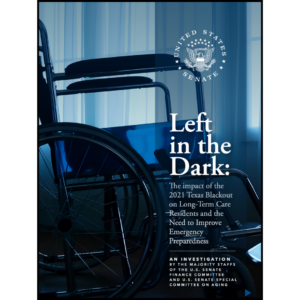HHS launches online tool for disaster readiness
The U.S. Department of Health and Human Services (HHS) has launched an online interactive tool to aid community health agencies and emergency management officials in disaster preparedness.
The tool, HHS emPOWER Map, is specifically for officials as they plan ahead to meet the emergency needs of community residents who rely on electrically powered medical and assistive equipment to live independently at home. According to HHS, more than 1.6 million Medicare fee-for-service beneficiaries nationwide rely on electricity-dependent medical and assistive equipment, such as oxygen concentrators, ventilators and wheelchairs.
The HHS emPOWER Map shows the monthly total number of Medicare fee-for-service beneficiaries’ claims for electricity-dependent equipment at the national, state, territory, county, and zip code levels. The tool incorporates these data with real-time severe weather tracking services from the National Oceanic and Atmospheric Administration in a Geographic Information System (GIS).
The integrated data accessible through the HHS emPOWER Map can help community organizations, including hospitals, first responders, and electric utility officials, work with health officials to prevent health impacts of prolonged power outages due to storms and other disasters on vulnerable residents, HHS officials say. For example, the HHS emPOWER Map could be used by electric utility companies to determine priority areas for restoring electrical service based on the location of the largest concentrations of electricity-dependent individuals. This could assist hospitals, healthcare coalitions and Emergency Medical Services in planning better for surges in medical services.
Emergency planners could also use the tool to anticipate whether emergency shelters might experience greater electricity demand due to higher concentrations of electricity-dependent Medicare beneficiaries nearby. Local officials could estimate more accurate assistance needs for transportation and evacuation when local mass transit systems are affected by prolonged power outages after disasters.
“For people who rely on electricity-dependent medical equipment, prolonged power outages can mean life or death,” Dr. Nicole Lurie, M.D., HHS’ assistant secretary for preparedness and response, said in a statement. “This tool helps communities better anticipate, plan for, and respond to these unique needs of this population and improve resilience for the entire community before and after disasters.”
I Advance Senior Care is the industry-leading source for practical, in-depth, business-building, and resident care information for owners, executives, administrators, and directors of nursing at assisted living communities, skilled nursing facilities, post-acute facilities, and continuing care retirement communities. The I Advance Senior Care editorial team and industry experts provide market analysis, strategic direction, policy commentary, clinical best-practices, business management, and technology breakthroughs.
I Advance Senior Care is part of the Institute for the Advancement of Senior Care and published by Plain-English Health Care.
Related Articles
Topics: Disaster Preparedness , Technology & IT











